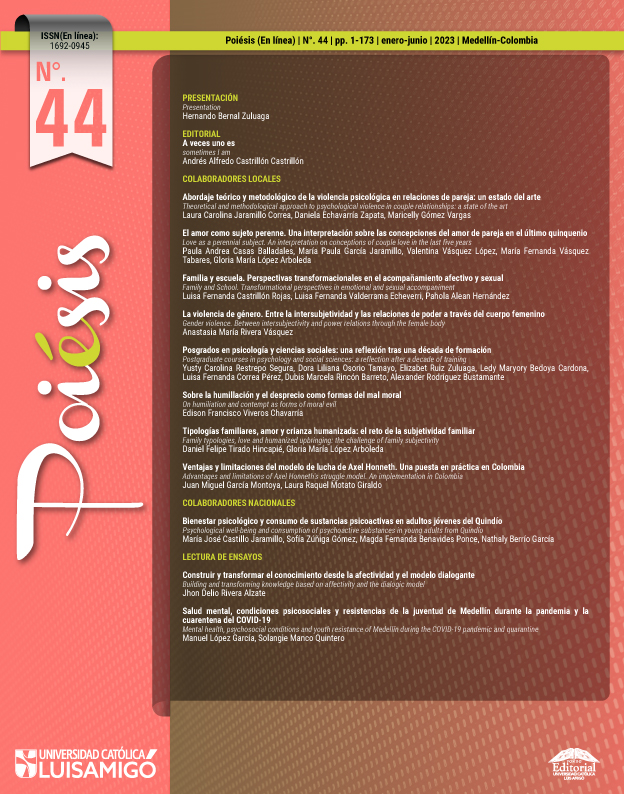Building and transforming knowledge based on affectivity and the dialogic model
DOI:
https://doi.org/10.21501/16920945.4221Keywords:
Emotions, Knowledge, Intercultural dialogue, Cognition, Distance education, Education, RealityAbstract
The Royal Academy Dictionary defines affectivity as "set of feelings, emotions and passions of a person", and knowledge from a philosophical perspective can be understood as a process by which reality is reflected and reproduced in the human mind. Affectivity becomes an important element that allows encouraging students in the search for new knowledge, as well as, its construction and practical transformation in different scenarios, through dialogue proposals that integrate the cognitive, the socio-affective and the practical. The following paper aims to analyze from a critical and reflective stance the importance of affectivity in the acquisition of knowledge, and a dialogic proposal that allows to address other fundamental issues in the educational process of learners.
Downloads
References
Cabarcas Bello, B. (2017). “El Kuagro, un Zambapalo en el aula”. Una propuesta pedagógica intercultural. Revista Adelante–Ahead, 8(1), 13 22. http://ojs.unicolombo.edu.co/index.php/adelante ahead/article/view/128/124
De Zubiría Samper, J. (2006). Hacia una pedagogía dialogante. (El modelo pedagógico del Merani). https://es.slideshare.net/viteriange/hacia-unapedagogiadialogante
García Cabrero, B. (2009). Las dimensiones afectivas de la docencia. Revista Digital Universitaria, 10(11), 01 12. http://www.revista.unam.mx/vol.10/num11/art71/int71.htm
Garritz Ruiz, A. (2009). La afectividad en la enseñanza de la ciencia. Educación Química, 20(1), 212-219. https://doi.org/10.1016/S0187-893X(18)30055-7
Macas Zhigue, M. F. (2019). Lo femenino en el pensamiento ancestral: pacha, mujer, e interculturalidad. XIII Congreso de Filosofía Intercultural, Universidad Católica Luis Amigó, Medellín, Colombia.
Martínez Pérez, F. M. (enero de 2009). El concepto de humanismo cristiano en la FUNLAM. (Directiva Pedagógica, 1-17) [Documento]. Fundación Universitaria Luis Amigó-Vicerrectoría Académica. https://vdocuments.mx/el-concepto-de-humanismo-cristiano-en-la-funlampdf.html?page=1
Real Academia Española. (2014). Afectividad. En Diccionario de la lengua española (23.ª ed.). https://dle.rae.es/afectividad
Vásquez Rodríguez, F. (2000). Oficio de maestro. Universidad Javeriana.
Published
How to Cite
Issue
Section
License

This work is licensed under a Creative Commons Attribution-NonCommercial-NoDerivatives 4.0 International License.
La revista y los textos individuales que en esta se divulgan están protegidos por las leyes de copyright y por los términos y condiciones de la Licencia Creative Commons Atribución-No Comercial- 4.0 Internacional. Permisos que vayan más allá de lo cubierto por esta licencia pueden encontrarse en http://www.funlam.edu.co/modules/fondoeditorial/ Derechos de autor.











